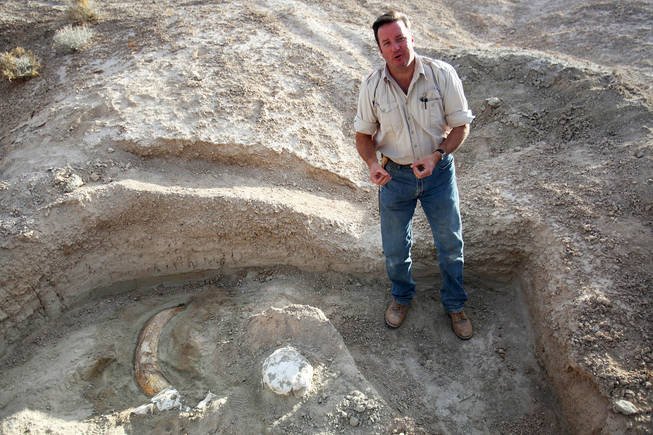
Eric Scott, a paleontologist from San Bernardino County Museum, talks Thursday, Dec. 2, 2010, about a partially unearthed Columbian Mammoth tusk in the proposed Tule Springs National Monument area in the north Las Vegas Valley.
Tuesday, Dec. 9, 2014 | 2 a.m.
By the end of this week, Las Vegans could have something that has eluded them for years: Thousands of acres of federal land to develop commercially.
Eight once-stalled Nevada lands bills look poised to pass Congress as part of a last-minute deal in the lame-duck session.
The bills would open up about 1,200 acres for commercial development in North Las Vegas and Las Vegas and create a new North Las Vegas campus for UNLV. They'll also create a Tule Springs national monument in the north valley, help expand a copper mine in Yerington and close 26,000 acres up north for wilderness protection.
Las Vegas City Councilman Steve Ross called it "a game changer." There could be a new health complex near the Veterans Affairs hospital in North Las Vegas, and Las Vegas could see a new high-tech industrial complex, possibly focusing on drones, between Nellis and Creech Air Force bases.
Plus, creating a national monument has the potential to boost tourism, said Ross, whose ward represents Tule Springs.
"We have North America's richest fossil bed in our backyard that's currently being managed by the Bureau of Land Management," he said. "That doesn't allow us to fully capitalize on the historic and educational opportunities there."
The bills passed the House of Representatives last week and should get a vote in the Senate this week. If they pass, they'll head to President Barack Obama's desk to be signed into law.
If that happens, this will be the largest lands package to pass Congress since about 2009. But it's far from a done deal: Lands bills have been tough to get through Congress recently in part because some conservatives oppose on principle transferring or creating federal land.
Here's everything you need to know about the deal.
How we got here at the 11th hour
Last week, Sen. Harry Reid, D-Nev., negotiated a deal with other western lawmakers and key Republicans to include the bills into a larger package on a bill that funds our military.
Exchanging land between the federal government and states doesn't have much to do with defense — although Sen. Dean Heller, R-Nev., argued the copper created in a Yerington mine is pertinent to national defense. (Parts of the lands bills also expand Fallon Naval Air Station and Nellis Air Force Base.)
But it does help ensure their passage.
Reid, the Senate Democrats' leader, has had trouble passing lands bills on their own. Conservative Republicans, like Sen. Tom Coburn of Oklahoma, object to proposals that expand federal control of land. In the Republican-controlled House, a lands deal popular in Nevada took more than three years and several tries to get through, and its chances in the Senate seemed slim.
"Reid has to find more creative ways to get these bills over the goal line," said Jim Manley, a former communications director for Reid.
So Reid attached the lands deal to one of the few pieces of legislation that Congress must pass before it goes home for the end of the year. Among other things, the 16,000-page, $585 billion defense spending bill authorizes troops to be paid and housed.
Lawmakers, especially Republicans, wouldn't dare hold up such an important bill because of a few land swaps out west — so goes Reid's game theory. It's high risk, but potentially high reward for Reid.
But hurdles remain
In today's dysfunctional Congress, bundling of unrelated bills is actually quite normal. Lawmakers (especially those with leverage, like Reid) typically engage in last-minute trading to get their projects attached to higher-priority legislation.
But that process doesn't sit well with everybody.
Coburn, a fiscal conservative who is retiring at the end of this Congress, said:
"A bill that defines the needs of our nation's defense is hardly the proper place to trample on private property rights," Coburn wrote in a letter to next year's Senate majority leader, Mitch McConnell, R-Ky.
Another opponent of the process is Sen. Ted Cruz, a Republican from Texas. Cruz implied Reid and other senators who put lands provisions in the defense bill, like Republican John McCain of Arizona, basically engaged in earmarks, which are banned in Congress.
"With the military's shrinking budget, it is offensive that this bill would be used to fund congressional pork," he said in a statement.
Rep. Mark Amodei, a Northern Nevada Republican who supports the lands bills, counters all these have been discussed in committee hearings. At least one has already passed the House of Representatives.
"It's like, hey, it shouldn't be a surprise to anybody," Amodei said.
Still, Coburn has vowed to use every procedural move he can to delay the bill — and lawmakers' Christmas break.
What remains to be seen this week is if Coburn's Republican colleagues, like Heller, can persuade him and other opponents to stand down.
In the balance hangs years of work on lands bills, and hundreds of potential jobs for Las Vegans.
Conor Shine contributed to this story.

Join the Discussion:
Check this out for a full explanation of our conversion to the LiveFyre commenting system and instructions on how to sign up for an account.
Full comments policy